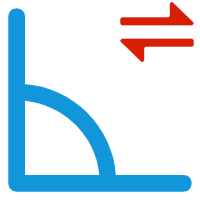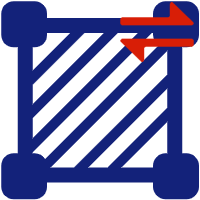
Kilogram-Force Meter to Newton Meter
Convert kilogram-force meters to newton meters with our torque converter. Perfect for engineering, automotive work, and torque specifications. Get accurate results.
Relationship Between Kilogram-Force Meter and Newton Meter
The conversion between kilogram-force meters and Newton meters involves converting between gravitational metric and SI units. The kilogram-force meter (kgf·m) is a gravitational unit, while the Newton meter (N·m) is the SI unit of torque.
1 kgf·m = 9.80665 N·m
Therefore, to convert kilogram-force meters to Newton meters, we multiply the value in kilogram-force meters by 9.80665.
For example, 1 kilogram-force meter equals approximately 9.807 Newton meters, and 10 kilogram-force meters equals approximately 98.07 Newton meters.
Kilogram-Force Meter
What is a Kilogram-Force Meter (kgf·m)?
A kilogram-force meter (symbol: kgf·m) is a gravitational metric unit of torque, representing the rotational force of one kilogram-force applied at a perpendicular distance of one meter from the axis of rotation. It equals approximately 9.80665 Newton meters. Kilogram-force meters are still used in some countries and industries, particularly where gravitational units remain in practice.
History and Origin
The kilogram-force meter emerged from the metric gravitational system, which was widely used before the adoption of the International System of Units (SI). It is based on the force exerted by one kilogram mass under standard gravity (9.80665 m/s²). While technically a non-SI unit, it has historical significance and continues to be used in certain regions and industries, particularly in automotive and mechanical engineering in countries transitioning to SI units.
Modern Applications
Kilogram-force meters are still used in some automotive, mechanical, and industrial applications, particularly in countries that historically used gravitational metric units. Common uses include: older automotive torque specifications, some industrial machinery documentation, mechanical engineering in transitional markets, and legacy equipment specifications. However, the unit is gradually being phased out in favor of Newton meters as part of global SI standardization. Most modern engineering and scientific work now uses Newton meters exclusively for torque measurements.
Newton Meter
What is a Newton Meter (N·m)?
A Newton meter (symbol: N·m) is the SI unit of torque, representing the rotational force of one newton applied at a perpendicular distance of one meter from the axis of rotation. It is the fundamental unit for measuring torque in the International System of Units and is used worldwide for scientific and engineering calculations.
Origin and Definition
The Newton meter is derived from the SI base units: force (Newton) and distance (meter). It was established as part of the International System of Units to provide a consistent, universal standard for torque measurements. One Newton meter equals one joule (the SI unit of energy), though the two measure different physical quantities—torque is a vector while energy is a scalar.
Current Use
Newton meters are the standard unit for torque specifications worldwide, except in countries primarily using imperial units. Common applications include: automotive engine torque (100-500 N·m), industrial machinery (50-5,000 N·m), bicycle components (5-50 N·m), electric motors (10-1,000 N·m), and precision instruments (0.001-10 N·m). The unit is preferred in scientific research, international engineering standards, and most modern manufacturing industries. Torque wrenches and measuring instruments globally are calibrated in Newton meters for precision and consistency.
Kilogram-Force Meter to Newton Meter Conversion Table
The conversion of kilogram-force meters to Newton meters for certain values are provided below:
- Kilogram-Force Meter [kgf·m]
- Newton Meter [N·m]
- 1 kgf·m
- 9.8067 N·m
- 2 kgf·m
- 19.6133 N·m
- 3 kgf·m
- 29.42 N·m
- 4 kgf·m
- 39.2266 N·m
- 5 kgf·m
- 49.0332 N·m
- 6 kgf·m
- 58.8399 N·m
- 7 kgf·m
- 68.6465 N·m
- 8 kgf·m
- 78.4532 N·m
- 9 kgf·m
- 88.2599 N·m
- 10 kgf·m
- 98.0665 N·m
- 15 kgf·m
- 147.0998 N·m
- 20 kgf·m
- 196.133 N·m
- 25 kgf·m
- 245.1663 N·m
- 30 kgf·m
- 294.1995 N·m
- 40 kgf·m
- 392.266 N·m
- 50 kgf·m
- 490.3325 N·m
- 60 kgf·m
- 588.399 N·m
- 70 kgf·m
- 686.4655 N·m
- 80 kgf·m
- 784.532 N·m
- 90 kgf·m
- 882.5985 N·m
- 100 kgf·m
- 980.665 N·m













































